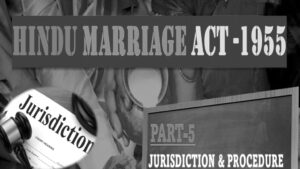Table of Contents
INTRODUCTION
Marriage plays a very important part in society, and the intention of the legislature cannot be to make any marriage invalid without considering all the facts. Domicile and registration are not important criteria for the validity of a marriage. Domicile may play a role when it comes to jurisdiction for issues arising after the marriage. In this article we understood Jurisdiction and Procedure under Hindu Law.

Section 19 – Court to which petition shall be presented
Every petition under this Act shall be presented to the district court within the local limits of whose ordinary original civil jurisdiction –
- the marriage was solemnized, or
- the respondent, at the time of the presentation of the petition, resides, or
- the parties to the marriage last resided together, or (iiia) in case the wife is the petitioner, where she is residing on the date of presentation of the petition, or;
- the petitioner is residing at the time of the presentation of the petition, in a case where the respondent is, at that time, residing outside the territories to which this Act extends, or has not been heard of as being alive for a period of seven years or more by those person who would naturally have heard of him if he were alive.
Section 20 – Contents and verification of petitions
- Every petition presented under this Act shall state as distinctly as the nature of the case permits the facts on which the claim to relief is founded and, except in a petition under section 11, shall also state that there is no collusion between the petitioner and the other party to the marriage.
- The statements contained in every petition under this Act shall be verified by the petitioner or some other competent person in the manner required by law for the verification of plaints, and may, at the hearing, be referred to as evidence.
Section 21 – Application of Act 5 of 1908
Subject to the other provisions contained in this Act and to such rules as the High Court may make in this behalf, all proceedings under this Act shall be regulated, as far as may be, by the Code of Civil Procedure, 1908.
Section 21A – Power to transfer petitions in certain cases
- Where-
In a case where sub-section (1) applies,-
a petition under this Act has been presented to a district court having jurisdiction by a party to a marriage praying for a decree for judicial separation under section 10 or for a decree of divorce under section 13, and
another petition under this Act has been presented thereafter by the other party to the marriage praying for a decree for judicial separation under section 10 or for a decree of divorce under section 13 on any ground, whether in the same district court or in a different district court, in the same State or in a different State, the petitions shall be dealt with as specified in sub-section (2).
- In a case where sub-section (1) applies,-
if the petitions are presented to the same district court, both the petitions shall be tried and heard together by that district court;
if the petitions are presented to different district courts, the petition presented later shall be transferred to the district court in which the earlier petition was presented and both the petitions shall be heard and disposed of together by the district court in which the earlier petition was presented
- In a case where clause (b) of sub-section (2) applies, the court or the Government, as the case may be, competent under the Code of Civil Procedure, 1908 (5 of 1908), to transfer any suit or proceeding from the district court in which the later petition has been presented to the district court in which the earlier petition is pending, shall exercise its powers to transfer such later petition as if it had been empowered so to do under the said Code.
Section 21B – Special provision relating to trial and disposal of petitions under the Act
- The trial of a petition under this Act shall, so far as is practicable consistently with the interests of justice in respect of the trial, be continued from day to day until its conclusion unless the court finds the adjournment of the trial beyond the following day to be necessary for reasons to be recorded.
- Every petition under this Act shall be tried as expeditiously as possible and endeavour shall be made to conclude the trial within six months from the date of service of notice of the petition on the respondent.
- Every appeal under this Act shall be heard as expeditiously as possible, and endeavour shall be made to conclude the hearing within three months from the date of service of notice of appeal on the respondent.
Section 21C – Documentary evidence
Notwithstanding anything in any enactment to the contrary, no document shall be inadmissible in evidence in any proceeding at the trial of a petition under this Act on the ground that it is not duly stamped or registered.
Section 22 – Proceedings to be in camera and may not be printed or published
- Every proceeding under this Act shall be conducted in camera and it shall not be lawful for any person to print or publish any matter in relation to any such proceeding except a judgment of the High Court or of the Supreme Court printed or published with the previous permission of the court.
- If any person prints or publishes any matter in contravention of the provisions contained in sub-section (1), he shall be punishable with fine which may extend to one thousand rupees.
MUST READ
NULLITY OF MARRIAGE AND DIVORCE
HINDU MARRIAGE ACT,1955 PART 2
